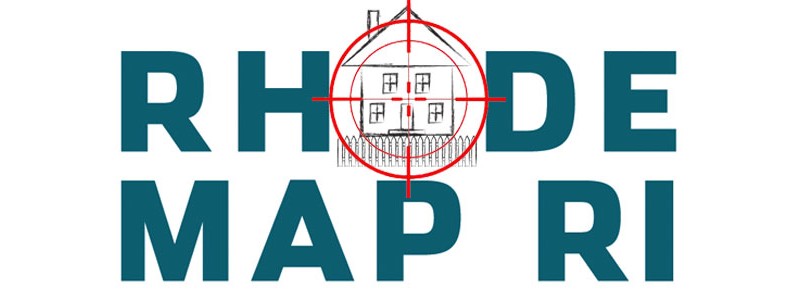
RhodeMap RI targets individual property rights
A number of recommendations made by the Center earlier this year in its Legislative Antidotes to RhodeMap RI post, are encapsulated in many of the bills below, which have already been introduced in the 2015 RI General Assembly session. Thank you to PRARI (the Property Rights Alliance of RI) for compiling this legislative list and descriptions.
Recently Introduced Legislation, RhodeMap RI Opt Out Provisions
1. H6040 http://webserver.rilin.state.ri.us/BillText/BillText15/HouseText15/H6040.pdf
Prohibits affordable housing program requirements, that exceed those set forth in the general laws of the state, from being included in the statewide planning program. Sponsors: Price, Roberts, Chippendale, Costa and Nardolillo
2. H6041 http://webserver.rilin.state.ri.us/BillText/BillText15/HouseText15/H6041.pdf
Allows cities and towns to opt out of provisions in the state guide plan that relate to affordable housing and the related land use provisions, by providing timely written notice of that decision to the chief of the RI Division of Planning. Sponsors: Roberts, Price, Chippendale, Filippi and Nardolillo
3. H6042 http://webserver.rilin.state.ri.us/BillText/BillText15/HouseText15/H6042.pdf
Allows cities and towns to opt out of provisions in the state guide plan that relate to affordable housing and the related land use provisions –by providing timely written notice of that decision to the chief of the RI Division of Planning. Sponsors: Costa, Lancia, Giarrusso, Reilly and Corvese
4. H6043 http://webserver.rilin.state.ri.us/BillText/BillText15/HouseText15/H6043.pdf
Repeals the provisions and references to compliance with the state guide plan relative to local comprehensive planning for land use. Sponsors: Nardolillo, Chippendale, Price and Roberts
Other Bills
1. H5643 http://webserver.rilin.state.ri.us/BillText/BillText15/HouseText15/H5643.pdf
Eliminates the state mandate requiring cities and towns to include an affordable housing program in the local comprehensive plan and actually prohibits its inclusion in the local comprehensive plan. (section 45-22.2-6, “RI Comprehensive Planning and Land Use Act”) Sponsors: Price, Reilly, Roberts, Costa, and Filippi
2. S653 http://webserver.rilin.state.ri.us/BillText/BillText15/SenateText15/S0653.pdf (Companion to H 5643)
Eliminates the state mandate requiring cities and towns to include an affordable housing program in the local comprehensive plan and actually prohibits its inclusion in the local comprehensive plan. (section 45-22.2-6, “RI Comprehensive Planning and Land Use Act”) Sponsors: BIPARTISAN – Cote, Raptakis, O’Neill, Gee and Kettle
3. H5644 http://webserver.rilin.state.ri.us/BillText/BillText15/HouseText15/H5644.pdf
Eliminates the state mandate requiring cities and towns to include an affordable housing program in the local comprehensive plan and provides an opt-out provision for this. It also provides an opt out provision from the state guide plan relating to affordable housing programs. (section 45-22.2-6, RI Comprehensive Planning and Land Use Act”) Sponsors: Roberts, Price, Filippi, Nardolillo, and Costa
4. S654 http://webserver.rilin.state.ri.us/BillText/BillText15/SenateText15/S0654.pdf (Companion to H 5644)
Eliminates the state mandate requiring cities and towns to include an affordable housing program in the local comprehensive plan and actually prohibits its inclusion in the local comprehensive plan. (section 45-22.2-6, “RI Comprehensive Planning and Land Use Act”) Sponsors: Cote, Raptakis, O’Neill, Gee, Kettle
5. H5713 http://webserver.rilin.state.ri.us/BillText/BillText15/HouseText15/H5713.pdf
Requires General Assembly approval of the state guide plan and any amendments to the state guide plan. (section 42-11-10 “Department of Administration”) Sponsors: Filippi, Costa, Price, Giarrusso, and Morgan
6. S26 http://webserver.rilin.state.ri.us/BillText/BillText15/SenateText15/S0026.pdf
Exempts Coventry, E. Greenwich and W. Greenwich from all the terms and provisions of 42-64.17-1 entitled “Long Term Economic Development Vision and Policy”. Sponsors: BIPARTISAN – Raptakis, Kettle, Morgan, Cote and O’Neill. Heard March 10, held for further study.
Bills to Address New Definition of Low and Moderate Income Housing
1. S172 http://webserver.rilin.state.ri.us/BillText/BillText15/SenateText15/S0172.pdf
Allows mobile homes to be included in affordable housing stock in Coventry. (Section 42-128-8.1) Sponsors: BIPARTISAN – Raptakis, Kettle and Fogarty
2. H5714 http://webserver.rilin.state.ri.us/BillText/BillText15/HouseText15/H5714.pdf
Changes what is included in the calculation of affordable housing stock. (Section 42-55-21.1 “RI Housing and Mortgage Finance Corporation”) Sponsors: BIPARTISAN – Filippi, Hearn, Marcello, Price, and Ackerman
3. S498 http://webserver.rilin.state.ri.us/BillText/BillText15/SenateText15/S0498.pdf
Allows mobile and manufactured homes to be counted as low and moderate income housing for purposes of compliance with Comprehensive land use plans. (Section 45-53-3 “Low and Moderate Income Housing”) Sponsors: BIPARTISAN – Fogarty, Ottiano, Kettle, and DiPalma
Bills to Address Eminent Domain
1. H5774 http://webserver.rilin.state.ri.us/BillText/BillText15/HouseText15/H5774.pdf
Public use is defined as it relates to eminent domain. (Chapter 37-6 “Acquisition of Land”) Sponsors: BIPARTISAN – Costa, Trillo, Newberry, Giarrusso, and Shekarchi
2. S622 http://webserver.rilin.state.ri.us/BillText/BillText15/SenateText15/S0622.pdf (Companion to H 5774)
Requires that condemning land cannot include taking for private entity for purpose of economic development. (Chapter 37-6 “Acquisition of Land”) Sponsors: Cote, Lombardo, Archambault, Lombardi, McCaffrey
Bills to Increase the Maximum Property Tax on Qualifying Low Income Property
1. H5328 http://webserver.rilin.state.ri.us/BillText/BillText15/HouseText15/H5328.pdf
Increases the maximum tax rate on qualifying low income property from 8% to 12% of previous year’s gross rent. (Section 44-5-13.11 “Levy and Assessment of Local Taxes”) Sponsors: Phillips, Morin, Casey, Bennett, Almeida
2. S32 http://webserver.rilin.state.ri.us/BillText/BillText15/SenateText15/S0032.pdf
Increases the maximum tax rate on qualifying low income property from 8% to 10% of prospective gross rent. (Section 44-5-13.11 “Levy and Assessment of Local Taxes”) Sponsors: Picard, Cote and Goodwin
3. S33 http://webserver.rilin.state.ri.us/BillText/BillText15/SenateText15/S0033.pdf
Increases the maximum tax rate on qualifying low income property from 8% to 10% of previous year’s gross rent. (Section 44-5-13.11 “Levy and Assessment of Local Taxes”) Sponsors: Picard and Goodwin
4. S562 http://webserver.rilin.state.ri.us/BillText/BillText15/SenateText15/S0562.pdf
Allows an increase in the maximum tax rate on qualifying low income property from 8% to 10% if LMIH stock represents 12% or more. (section 44-5-13.11 “Levy and Assessment of Local Taxes”) Sponsor: Picard
5. S112 http://webserver.rilin.state.ri.us/BillText/BillText15/SenateText15/S0112.pdf
Allows an increase in the maximum tax rate on qualifying low income property from 8% to 15% when budget commission or court appointed individual involved with city/town. Sponsor: Picard
BAD BILLS
Bills to Allow State Intrusion on Municipal Property Taxation
1. H5518 http://webserver.rilin.state.ri.us/BillText/BillText15/HouseText15/H5518.pdf
Mandates that municipalities do not charge impact fees to developers for 36 months or until 1,500 permits statewide. (section 45-22.4 “RI Development Impact Fee Act”) Sponsors: Shekarchi, Edwards, Solomon, Ucci, and McKiernan
2. H5545 http://webserver.rilin.state.ri.us/BillText/BillText15/HouseText15/H5545.pdf
Mandates that municipalities do not charge impact fees to developers for 36 months and mandates the reduction of municipal permit fees. (section 45-22.4 “RI Development Impact Fee Act” and section 23-27.3 “State Building Code”) Sponsor: Jacquard
3. H5550 http://webserver.rilin.state.ri.us/BillText/BillText15/HouseText15/H5550.pdf
Mandates that permit fees and special fees for new construction will be determined by the state building code commission, not the local municipality. (Chapter 23-27.3 “State Building Code”) Sponsors: BIPARTISAN – Shekarchi, McKiernan, Trillo, Lima, and Edwards
Bills to Divert Funds To Densely Populated Cities
1. H5552 http://webserver.rilin.state.ri.us/BillText/BillText15/HouseText15/H5552.pdf
Creates an Urban Infrastructure Commission (to include 4 members of a 2,000 per square mile municipality) along with an Urban Renaissance Fund and provide that the state plays a central role in developing and supporting a targeted urban infrastructure program. (Title 42 – “State Affairs and Government”) Sponsors: McKiernan, Shekarchi, Lombardi, Carnevale, and Almeida



 …
… 

